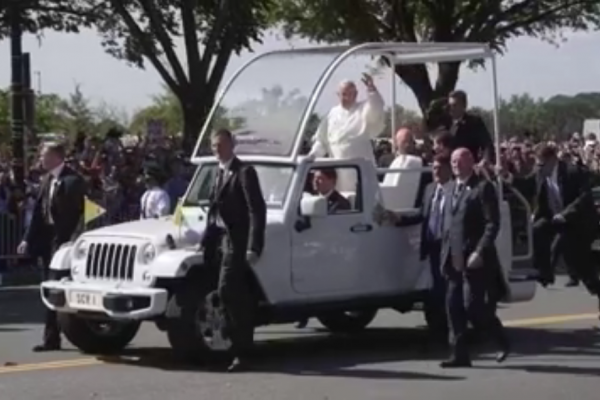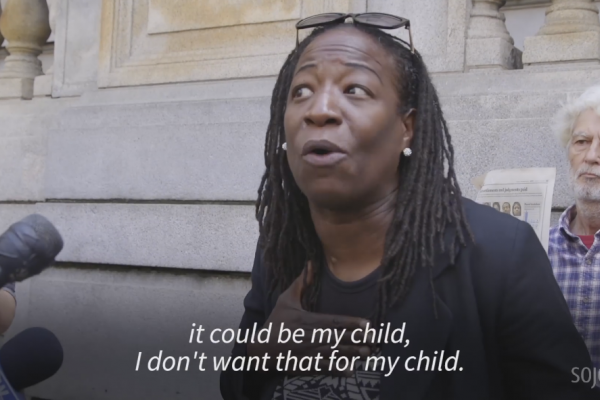The Vatican on Aug. 10 announced a World Day of Prayer for the Care of Creation, the latest move by Pope Francis to push environmental issues up the global agenda.
The World Day will be celebrated annually on Sept. 1, in line with the Orthodox Church’s day for the protection of the environment, the pope said in the newly-released letter.
“As Christians we wish to offer our contribution towards overcoming the ecological crisis which humanity is living through,” Francis wrote in the letter, addressed to Cardinal Peter Turkson, president of the Pontifical Council for Justice and Peace, and Cardinal Kurt Koch, president of the Pontifical Council for the Promotion of Christian Unity.
In honor of the one-year anniversary of Michael Brown’s death in Ferguson, Mo., Sojourners asked a variety of faith leaders — Catholics, Baptists, Muslims, agnostics, evangelicals, and humanists — to reflect: How has your faith been challenged, affirmed, or deepened by the Black Lives Matter movement? Has your theology changed? And, most importantly, what are we being called to do?
Here’s what they said.
Seventy years after the U.S. dropped an atomic bomb on the Japanese city of Nagasaki, Pope Francis on Aug. 9 described the bomb as a “lasting warning to humanity.”
Speaking to the faithful gathered in St. Peter’s Square, Francis recalled the “horror and repulsion” aroused by the twin bombings of Nagasaki on Aug. 9 1945, and Hiroshima, three days earlier.
“This (event) has become the symbol of mankind’s enormous destructive power when it makes a distorted use of scientific and technical progress,” he said.
Even as the disciples of Jesus grieved at the foot of the cross, they understood there was work to be done. The work of justice is deeply political and requires an engagement in this present world. With tears in our eyes, we are called to march, rally, petition, sing, dance, create art, and use whatever gifts and talents we possess for the work of justice. The work of justice is deeply theological. Our church communities must foster a faith that gives people room to grow, to stretch, and to ask the tough questions. A grieving people need a theology for such a time as this, a theology that speaks to this present age. White churches, in particular, must end their silence and address the pain of grieving black lives, because the work of justice is collective. Even if you cannot possible understand all the reasons for our pain, you can come alongside a grieving people in love, humility, and solidarity.
From Baltimore to Berkeley, people are asking the question. Do black lives matter? It has been a year and we cannot seem to find an answer to the question. “Of course they do” some people state. “Then why is it so hard for so many to be black or brown in this country?” is the question that follows.
"Maybe if they just pulled their pants up and turned the music down,” is a common enough retort. Then, as I hope you can see, we’re back where we started.
A young man walks into Mother Emmanuel AME Church and nine lives come to a tragic end. The “politics of respectability” cannot save black and brown lives either. You can be a respected member of the state government, a pastor, a grandmother, and none of that will matter. You can be president of the United States of America and it won’t matter. Your race will be a strike against you.
It's a call and response chant started on the streets of Ferguson that has spread across the nation.
"Mike Brown means ..."
"... we got to fight back!"
It rolls off my tongue in a sing-chant cadence, and my hips begin to sway, because I have yelled it as I've marched and rehearsed it in my dreams. It is bitter and sweet. We evoke Mike's name and sway and pledge to fight. I've listened to voices I know and those I don't call and answer in hours of live stream and together in front of court houses and I know, I know in my soul what Mike Brown means.
Mike Brown means ... something more. Something larger than one more young black man shot in his neighborhood.
One year later, Mike Brown means ... something more.
1. WATCH: Jon Stewart and ‘The Daily Show:’ 9 Essential Moments
The New York Times offers this great video retrospective from 16 years of Jon Stewart nailing it four nights a week. He will be missed. #JonVoyage
2. The Women of the Protest Line
Almost a year after Michael Brown’s death, Amy Pedersen writes on how the movement in Ferguson, Mo., and beyond is largely a movement of women. “When you watch this weekend from afar, know that you are watching the movement of women; that we are on the street because that is where God is moving. … We are women and because we are women, we know how to be brave.”
3. A Haunting Timelapse of the 2,058 Nuclear Detonations from 1945 to 1998
This week marks the 70th anniversary of the nuclear bombings of Hiroshima and Nagasaki, ushering in the Nuclear Age. Popular Mechanics provides this arresting visual of detonations since then. Note: Keep an eye on the tickers for Russia and the U.S.
In the last week, while Twitter commemorated the 50-year anniversary of the #VotingRightsAct and mourned the 70-year anniversay of the #Hiroshima and #Nagasaki bombs, another justice hashtag began trending: #DearNonNatives.
Begun as a way to raise and spotlight voices that are too often overlooked — Native Americans in the United States — #DearNonNatives simultaneously calls attention to stereotypes of Native culture, and the continuing issues faced by Native communities, from high rates of sexual violence, poverty, and teen suicide to being disproportionately killed by law enforcement officials.








